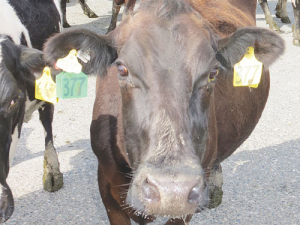DairyNZ opens applications for associate director role
DairyNZ is giving New Zealand farmers a unique opportunity to gain hands-on governance and leadership experience within the dairy sector.
 The New Zealand dairy industry has shifted to fewer herds with a greater focus on their performance.
The New Zealand dairy industry has shifted to fewer herds with a greater focus on their performance.
New Zealand's dairy sector is evolving, with the latest data showing a shift to fewer herds and a greater focus on their performance.
According to the New Zealand Dairy Statistics 2017-18 report, published by DairyNZ and LIC, there were 11,590 dairy herds last season – 158 fewer than the previous season.
This was the third year of decreasing herd numbers, but the average herd size increased by 17 cows to 431. The total 2017-18 cow population was 4.99 million, an increase of 2.7% from the previous season but still below the peak population of at least 5.01m cows in the 2014-15 season.
DairyNZ senior economist Matthew Newman says despite last year’s challenging spring weather, milk production was only slightly decreased.
Dairy companies processed 20.7 billion litres of milk last season, containing 1.84b kgMS, down 0.6% on the previous season.
“Farmers benefitted from favourable late summer and autumn conditions so a number of the regions were able to milk their herds longer into the new year, which supported reasonable production for the year,” says Newman.
Sharemilking arrangements were down by 44 herds from the previous season. Herds under sharemilking arrangements have declined from 36% in 2008-09 to 27% of herds in 2017-18.
“This movement from sharemilking to contract milking is driven by people wanting the greater certainty of milk income that contract milking provides,” says Newman.
The report also showed a surge in the uptake of herd improvement services, as farmers seek higher performing and more efficient dairy cows through the use of herd testing and artificial breeding (AB).
A total of 71.1% NZ herds were herd tested (8242 herds), up from 64.3% (7557) in 2016-17. Total cows herd tested was 3.62m, up from 3.21m last season and close to the record level of 3.65m in 2014-15.
LIC general manager NZ markets Malcolm Ellis says this reflects a shift to precision agriculture, as farmers work to optimise their systems.
“The days of significant cow growth may be over and we know that farmers are more focused on productivity and efficiency. Without doubt farmers are wanting to know more about the production status of the cows they milk, gain more confidence about their parentage and certainly invest appropriately to breed superior livestock into the future.”
While the number of cows mated to AB had a nominal increase of 1.01%, the number of yearlings mated to AB jumped 17% on the previous season which Ellis says reflects farmers identifying every opportunity to maximise the rate of genetic gain.
Genetic gain is worth upwards of $200m to the NZ dairy sector each year.
While things are looking positive for the red meat sector in 2026, volatility in global trade remains a concern, says the Meat Industry Association (MIA).
The quest to find innovative practical, scientific solutions to deal with water-related issues at a catchment level has been the theme of an important conference at Massey University last week.
One of the country's top Māori farms faces a long and costly rebuild to get the property back to where it was before recent storms ripped through it.
The latest Global Dairy Trade auction results have delivered a boost to dairy farmers.
New Zealand potato growers are prioritising value creation from high yields to meet a complex mix of challenges and opportunities, says Potatoes NZ chief executive Kate Trufitt.
A Hawke's Bay apple orchardist supports the Government's objective of doubling exports but says this won't happen in the horticulture sector unless there's a change in the process for bringing new plant material into the country.

OPINION: First on the scene after the recent devastating storms in parts of the North Island were emergency services and selfless…
OPINION: Why can't Christopher Luxon stand up to Winston Peters over the latter’s high-profile attack on the proposed Indian FTA?